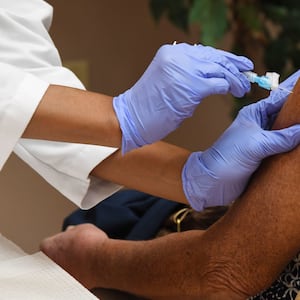Approximately a third of U.S. military servicemembers are declining the COVID-19 vaccine, a Pentagon official told a congressional panel on Wednesday.
The Joint Staff’s vice director for operations, Air Force Maj. Gen. Jeff Taliaferro, told the House Armed Services Committee that “acceptance rates are somewhere in the two-thirds territory,” according to initial data. A similar rate of vaccination acceptance holds for National Guardsmen as well, according to Air Force Maj. Gen. Steven S. Nordhaus, the National Guard Bureau’s director of operations, who likened the acceptance rates to those of the civilian population.
Taliaferro stressed that the vaccine is “clearly safe for servicemembers” but acknowledged a need for additional education, “to help them understand the benefits,” given the refusals to take the vaccines.
A senior Pentagon civilian, Robert Salesses, said the Defense Department has fully vaccinated 147,000 servicemembers, out of 359,000 who have received an initial dose of the vaccine. A Pentagon representative did not immediately respond to a request for comment.
At least 235,258 people within the Department of Defense have contracted COVID-19 in the past year, according to a Military.com tally, comprising 150,910 military, 24,189 dependents, 45,106 civilians, and 15,053 Defense Department contractors. At least 277 of them have died.
Outbreaks have been particularly brutal on Navy ships, like the USS Theodore Roosevelt, which is battling its second outbreak in a year. Its first outbreak killed at least one sailor, infected one in four people, and cost Capt. Brett Crozier his job.
“We are not at war. Sailors do not need to die. If we do not act now, we are failing to properly take care of our most trusted asset—our sailors,” Crozier wrote in a now infamous letter to his superiors that leaked to reporters.
Research published in the journal Social Science & Medicine last month found that a similar proportion of the general population—about 31 percent—had no interest in getting the vaccine.
Women, Black Americans, and those who were politically conservative were most likely to be skeptical. Women were 71 percent more likely to forego vaccinations and, given that women make the vast majority of health-care decisions for their family, their reluctance may extend to men and children too, the study’s authors noted.
With additional reporting by Rachel Olding







